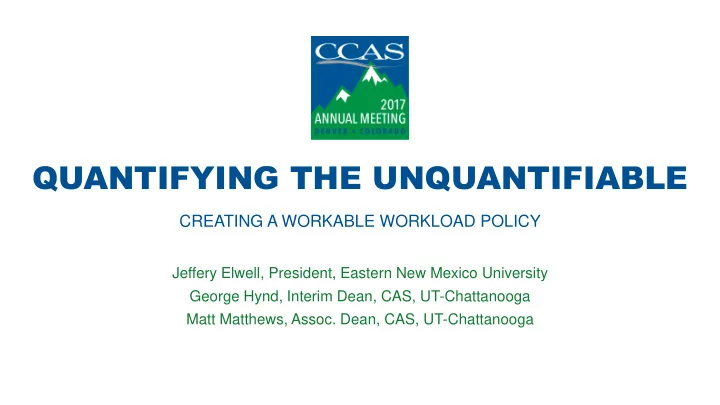

QUANTIFYING THE UNQUANTIFIABLE CREATING A WORKABLE WORKLOAD POLICY Jeffery Elwell, President, Eastern New Mexico University George Hynd, Interim Dean, CAS, UT-Chattanooga Matt Matthews, Assoc. Dean, CAS, UT-Chattanooga
CHAPTER 1 2014-2015 – Provost empanels large committee to build university-level faculty workload policy, includes faculty and department heads across colleges Policy draft is submitted, reviewed, never enacted Down the memory hole…
CHAPTER 2 One year later… 2016-2017 – Provost empanels small committee to build university-level faculty workload policy, includes four heads from two of four academic colleges Policy draft is submitted, reviewed, presented by provost to Faculty Senate Faculty Senate ends year with no action Down the memory hole…
CHAPTER 3 2016-2017: College of Arts & Sciences obtains permission to build own faculty workload policy Example policies from peer institutions are collected, examined During fall semester, draft built around principles learnt from previous two years Vetted by department heads and faculty across college Feedback fed into revised version Final version endorsed by department heads in spring Accepted by Provost over the summer
CHAPTER 3 What principles? Build from established norms Empower department heads to assign workloads Respect departmental roles Incorporate faculty ideas Dean retains final say as necessary Avoid points systems which invite arbitrage Goldilocks Principle: Not too much, not too little
ESTABLISHED NORMS Borrows heavily from UTC Faculty Handbook (pro-faculty) As described in the UTC Faculty Handbook, a faculty member’s assignment serves to further the “three broad substantive areas” which define how UTC accomplishes its mission: Instruction, Research, and Public Service. Teaching output framed around Delaware Norms (pro-admin) The National Study of Instructional Costs and Productivity (colloquially known as The Delaware Study) provides a set of department-specific productivity measures, typically in terms of student credit hours (or SCH), and the College shall annually set average teaching workload expectations based on these measures.
EMPOWER HEADS EDO (annual evaluation system) used to assign workload, measure outcomes Within annual EDO evaluations, the head of each department will be responsible for assessing each faculty member against the department’s research, scholarship, or creative activity workload guidelines. Department heads lead and manage Each department head will be responsible for assigning individual fall semester teaching workloads in an equitable manner that serves student, programmatic, and institutional needs.
RESPECT ROLES A department requires faculty in a variety of roles Each faculty member’s role within the department should be considered carefully when the department head assigns teaching workloads. Relationship between teaching and scholarship The differentiation among faculty types provides for appropriate teaching loads for faculty members with a research, scholarship, or creative activity expectation. Faculty members who maintain scholarly productivity, as defined by the department’s bylaws […] will remain eligible for a lower teaching load to permit continued activity. Tenure-track and Non-tenure track Lecturers, clinical instructors, and visiting faculty are exempt from those additional faculty obligations.
FACULTY IDEAS Two rounds of input from faculty and department heads Percentages for three areas adjusted to accommodate NTT faculty Recognition of faculty-guided research or honors projects Language to recognize creative activity as a type of scholarship Was not in handbook Many concerns rooted in “we like our handbook” Twelve semester hours vs. SCH production Ultimately endorsed unanimously by department heads
DEAN ENFORCES Setting teaching requirements for departments Each department head will be responsible for assigning individual fall semester teaching workloads in an equitable manner that serves student, programmatic, and institutional needs . […] Finally, the department productivity average should reach at least 95% of the expectation set by the College. Setting teaching requirements for faculty Exceptions to these ranges may be granted on a per-semester, per-faculty basis with prior approval of the College. Department bylaws set standards for scholarship, service But the dean must approve bylaws!
AVOID ARBITRAGE Used broad ranges for big three areas Teaching around the norms very broad Left bickering about scholarship, service value to departments When a baroque point system exists, clever academics will find the exploits Example system, courses with contact hours in excess of credit hours [In this example the] three additional contact hours exceeding credit hours may be multiplied by a factor of 0.5 and then added to the credit hour value of the course as shown below: 6 Contact Hrs. - 3 Credit Hrs. = 3 Excess Hrs. x 0.5 Factor = 1.5 + 3 Cr. Hr. = 4.5 ACH
CHAPTER 4 2016-2017: Implementation! Actually too late to set all fall semester expectations, but heads understood Some departments embraced English developed own policy, moved scholars to 3-3 load One head set workloads according to policy, faculty member retired Others struggled BGES has 0 (zero) credit hour labs paired with 4 credit hour lectures – wreaks havoc Mathematics adjusted all courses to have equal SCH production (108 SCH per section)
CHAPTER 4 Still dealing with arbitrage Adjunct assignments still measured in semester credit hours Faculty assignments in student credit hours Academic Affairs has expressed concern over Delaware norms, reverts to speaking about sections again As expected adjunct and overload budgets have been affected Some departments were teaching overall 150% of Delaware norm Now can justify request for adjunct/overload support Moreover, College can point to total teaching output of 125-140%
REPORTING
REPORTING
TAKEAWAYS Designing effective workload policy is hard, so… 1. Use existing documents, leverage familiarity during change 2. Revise with faculty input, build buy-in 3. Respect department variability 4. Empower closest responsible admin (dept head) with flexibility 5. Praise the early adopters, press against the resistance 6. Report data regularly, with transparency
QUESTIONS?
CONTACT US Jeffery Elwell Jeff.Elwell@enmu.edu George Hynd George-Hynd@utc.edu Matt Matthews Matt-Matthews@utc.edu
THANK YOU
Recommend
More recommend